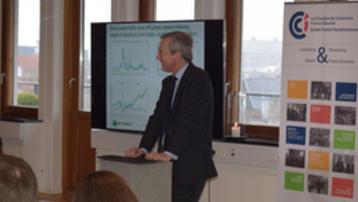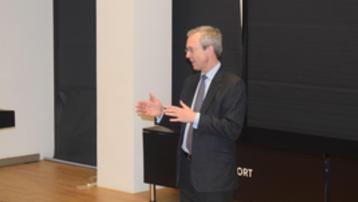La Chambre
Interview with Anders Torbøl about the new Dual Tax Agreement

The introduction of the new Dual Tax Agreement is, in fact, the fruit of years of work, where the Chamber of of Commerce has been instrumental.
The introduction of the new Dual Tax Agreement between France and Denmark is, in fact, the fruit of years of work, where the Danish-French Chamber of Commerce has been instrumental. For the Chamber, it is our chairman Anders Torbøl, who has been leading this project. We have therefore found it interesting to hear a little about this story.
How did you initially get the idea to take up this problem?
After the defeat of the negotiations for a new Dual Tax Agreement between France and Denmark in 2008 and the termination of the old Agreement by the Danish Government, it was for a long time considered that the lack of an Agreement was not a real problem for business.
In the Chamber, we did however get so many inquiries stemming from the absence of an Agreement, that we got suspicious about the claim that the lack of an Agreement meant nothing to business. We therefore gathered a group of the largest French and Danish companies for a breakfast meeting in the French Embassy, which took place in summer 2016.
At this meeting, it became clear that the lack of an Agreement gave rise to serious problems and considerable costs for the companies, and it was decided to write a joint letter to the French and Danish ministers responsible for this area. A letter, sent by the Chamber and cosigned by the 18 companies, 9 French and 9 Danish. This should be the first in a long series of letters to assist and promote first the discussions and thereafter the negotiations on the new Dual Tax Agreement.
What was the reaction of the Ministers?
We got positive answers from both ministers and the Danish minister Karsten Lauritzen accepted to meet with us and at a meeting at the French Embassy on the 27th of October 2016, where he promised to approach the French government with a view to open negotiations. However, it became clear to us early on that should this process succeed, it would be necessary for us to get close contact to both sides and play a positive and constructive role all the way through.
How did you manage to fulfil both of these requirements?
We set up a working party with me as chairman and representatives from the 18 companies as well as some experts. It was a working party, which should possess the necessary expert knowledge and be able to take snap decisions, when letters needed to be sent to the two parties. Here we had enormous help from all the companies and in particular from Jens Lund, DSV who initially gathered most of the Danish companies to join, from Clive Baxter, MAERSK and Mads Kristensen, ISS, Mette Bak, TotalEnergies, Tommy Ayouty, Thales, Sebastien Bliaut, VINCI, Henrik Aas, Novo Nordisk, and Robert Mikelsons, Njord Law Firm with their profound knowledge of international tax matters.
However, this was not enough. It would be necessary to create a close contact to both sides. Here the active participation of, on the one side, the French Embassy with the two ambassadors, Caroline Ferrari and Christophe Parisot and the economic counsellors, Marc Bouteiller and Claire Camdessus, and, on the other side, the heads of the international office of the Danish Ministry for Taxes, Henrik Stenbjerre and Nina Kristensen, and, finally, to ensure the ratification, the Danish Tax Minister, Jeppe Bruus, and the French Minister for Foreign Trade, Olivier Becht, played an essential role.
How were you able to keep up the steam for so many years?
Above all, this needed somebody who could follow the case and keep in contact with both sides all the way through up to the debate and vote in the Parliaments and get the working party together with short notice. That role became mine. But that being said, it was not that difficult to keep the attention in view of what was at stake for each of the companies. At one point, we did actually make an investigation of the cost of the companies caused by the lack of an Agreement. It turned out that most of the companies estimated their costs to be somewhere between 10 and 25 million DKK plus lost business due to the less competitive position compared to companies from countries with an Agreement in place.
So now that we have a new Dual Tax Agreement, what do you consider the most important results?
There is a vast number of advantages, but the most important one is that there is now a clear definition of permanent establishment, that dual taxation stops and that there is a procedure by which the tax authorities shall meet and find solutions to any question of interpretation of the Agreement. To this can be added a number of concrete results such as taxation of royalties, taxation of persons working for a shorter time in the other country, and taxation VIE’s. But of course, there will still be a lot of matters to be specified in the application of the Agreement, so we will have to follow the development closer for some time.





